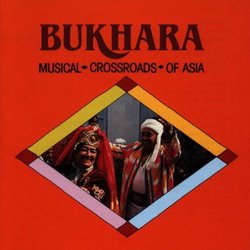Mostly not really my thing, but it may be yours
Pharoah S. Wail | Inner Space | 12/05/2004
(3 out of 5 stars)
"I've had this disc for 3 years now and have come back to it quite often. Most recently today. I've decided to review it now because I'm finally convinced that it's not really my thing.
There are 2 styles of music presented here. One is celebration music performed by women, and the other is vocal art-music performed by men. There is only one track I like by the men. #6, solo male vocal with rabab accompaniment. Actually I completely like that track, and it's also one of the longest of the disc at 10 or 13 minutes.
My thing with most of the male music here is that it's very detatched and stiff. It's music for the sophisticates of Uzbek culture. The elite, you could say... the people who want to listen to something and clap politely afterwards, never having to be bothered by emotional involvement with the music. Much of it just sounds to me like solo-vocal religious proclamations being delivered for posterity.
The music by the women here I like much more. It's more along the lines of what you'd imagine being caught up in as an outsider who is lost in the streets of Bukhara while the locals are partying.
Even my enjoyment of the women here is along the lines of "I like it when compared to the men", though. Except for track #3. I quite like that one. What it really comes down to though is this... if I accidentally drop and step on this cd tomorrow and snap it in half, I won't buy it again. It was nice having it all this time, as it fulfilled my curiosity about this hybrid of Jewish and Muslim Uzbek styles, but most of it doesn't do it for me. I have one other disc of straight Uzbek music that I'm not all that into either, and I'm not sure why because on the Afghanistan Untouched 2-disc set that I reviewed here a while back, part of that music is by Uzbek people living in Afghanistan and I love it. I highly recommend that disc, though it is by no means all Uzbek musics.
As much as this music doesn't really do it for me, I still give it 3 stars because the recording quality is nice and this truly is the authentic music. There are no drum machines here or any other attempt at Westernizing and pop-ifying this music to make it more palatable to Western ears. If you want some straight-up real music from Bukhara, this is your disc. My other Uzbek disc, which I'll review tonight or tomorrow, isn't quite as real as this one to my ears, being that a large part of it is from a radio orchestra... sort of like a folk music repertory band.
"
Not Authentically Bukharan
djonn | Toronto, On | 06/11/2006
(2 out of 5 stars)
"This Cd is of music recorded in Uzbekistan after Central Asia began opening up to outsiders. Essentially, this is the music of Uzbekistan after having been under the Soviet boot for 70 - 80 yrs and therefore not authentically Bukharan. As such it was misleading to call it "Bukhara"; it should have been called "Uzbekistan". I purchased it thinking that I would find authentic Bukharan music and was disappointed.
The Khanate of Bukhara existed in an area that today is partly in Uzbekistan and partly in Tadjikistan. The language and culture was more Tadjik (Persian) than Uzbek (Turkic). The Russians carved up Central Asia into the present day republics based on their anthropological research. When the Bolsheviks took over, severe educational, religious and cultural restrictions were implemented (although not as harsh as in other parts of the Former Soviet Union) and enforced. As a result one will notice a great difference in the language, food, clothing and music between Bukharans who left at the time of the Russian Revolution and those who have left in the last 15 - 20 years.
For me, searching for the songs and sounds that I miss, this CD was a disappointment. The best recording I have found thus far is one called "Folk Music of Palestine" which was a recording made in the 40's of expatriate Bukharans (as well as others) by the Smithsonian Institution. This too though is unsatisfying as it contains only portions of songs rather than the songs in their entirety. But it is authentic.
Well, still looking."


 Track Listings (13) - Disc #1
Track Listings (13) - Disc #1